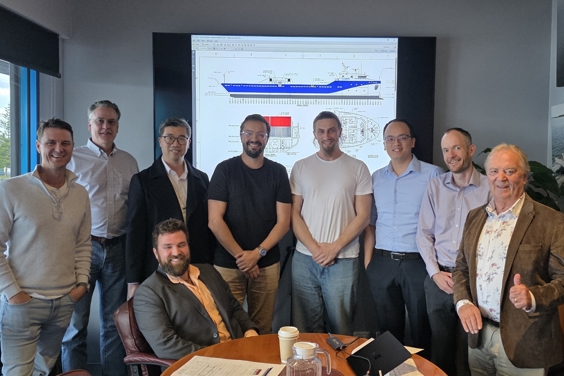Lloyd’s Register (LR) has successfully conducted a Hazard Identification (HAZID) workshop to evaluate the potential risks and operational factors for modular micro reactor (MMR) nuclear technology in maritime settings.
This innovative approach could pave the way for propulsion and sustainable energy solutions in remote or off-grid locations using sea-based platforms.
The international workshop, in collaboration with Queensland's ship design group Seatransport and Houston-based Deployable Energy, brought together multidisciplinary experts at Seatransport’s headquarters on the Gold Coast in Australia.
The session focused on risk management strategies, safety systems, regulatory frameworks, and vessel design implications, aiming to clarify certification pathways and compliance benchmarks. With safety and regulatory integrity at the forefront, the workshop offered key insights into the feasibility and requirements for operational readiness, once the vessel meets nuclear licensing requirements.
The workshop is part of a collaboration between Seatransport, Deployable Energy and LR, a global professional maritime services group, to develop nuclear power generation for different applications, including propulsion and strategic emergency response in remote areas.
Using micro modular reactor (MMR) technology, two MMRs will provide the 73-metre stern loading vessel power enabling the vessel to operate for 8-10 years without refuelling and supply power to shore grids during port docking or in affected zones.
Matt Palmer, Global Nuclear and Naval Submarines Segment Director at LR, said: “MMR technology not only reduces our dependence on traditional fossil fuels but also provides a reliable, long-term energy source that can support both operational and emergency needs in remote and underserved regions.”
Remko Hottentot, LR Commercial Manager – Australasia, said: “By bringing together leading experts in the field, we have not only identified the key challenges but also outlined strategic solutions to overcome them. These will now be incorporated into the vessel design. This collaborative effort has significantly strengthened our partnership and set a clear path for future advancements using MMR technology for sustainable maritime energy solutions.”
Dr Stuart Ballantyne, Chairman of Seatransport, said: “In my many years advocating nuclear propulsion, I believe now for commercial ships it is within reach and will be commonplace by 2030. My thanks for all visionaries working in this space.”
Bobby Gallagher, CEO and CTO Deployable Energy, said: “Deployable Energy is proud to be advancing toward Approval-in-Principle for the hybrid-powered Stern Landing Vessel. Powered by our 1MW Unity Nuclear Battery, this next-generation vessel runs cheaper than conventionally fuelled ships, using safe, standard fuel with no exotic materials. Deployable Energy is delivering clean, scalable energy to transform shipping, resource production, and heavy industry.”









